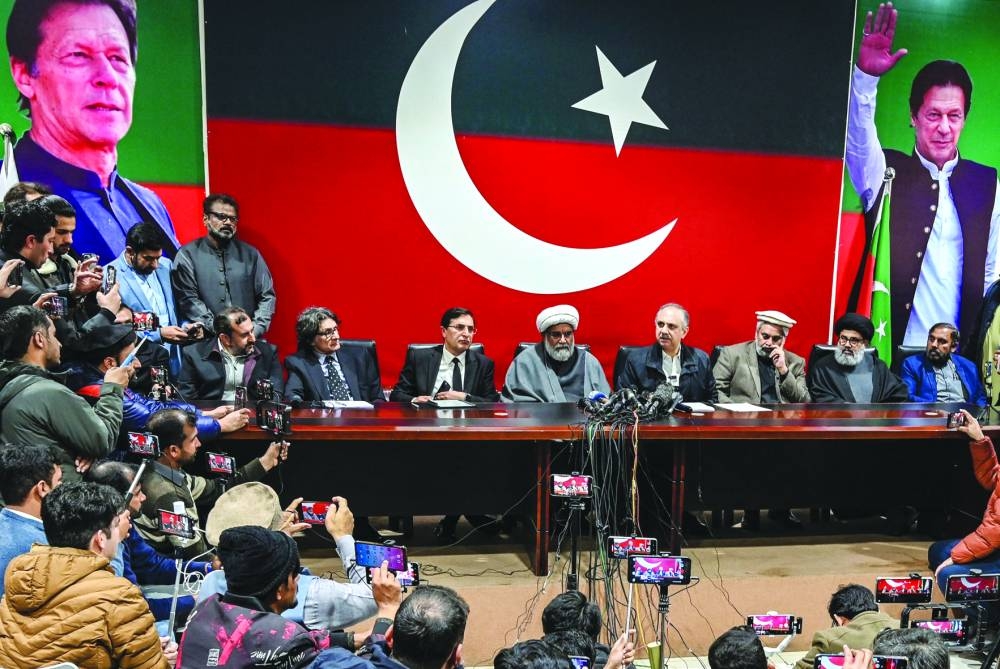Pakistani politicians loyal to jailed former prime minister Imran Khan will forge an alliance with a little-known political group, his party said on Monday, after polls marred by allegations of manipulation returned no clear winner.
Candidates backed by Khan’s Pakistan Tehreek-e-Insaf (PTI) party won the most seats in this month’s election but were effectively sidelined because they were forced to stand as independents.
The army-backed Pakistan Muslim League-Nawaz (PML-N) failed to secure a ruling majority but has forged a partnership with the Pakistan People’s Party (PPP) and a handful of smaller parties to form the next government.
However, PTI still hopes to seek a majority by having its candidates join the Sunni Ittehad Council (SIC), a registered political party whose chairman was the only one from the alliance of Islamic political and religious parties group to win a seat.
“We have reached a consensus that our provincial and National Assembly candidates will join Sunni Ittehad Council,” PTI chairman Gohar Ali Khan told a news conference.
Successful PTI-backed candidates will send their applications to join the SIC this week to the Election Commission of Pakistan, which must approve the alliance.
If the commission signs off on them, the alliance could then be entitled to seats reserved for women and religious minorities that are allocated according to election results.
“After this alliance, PTI will be in a position to form a government in the provinces as well as in the Centre,” Omar Ayub Khan, PTI’s candidate for prime minister, told the news conference, referring to the National Assembly.
There have been widespread allegations of vote-rigging and result manipulation after authorities switched off Pakistan’s mobile phone network on Election Day and the count took more than 24 hours.
A senior bureaucrat announced at a news conference on Saturday that he had helped rig the February 8 election and would hand himself in to police.
“We converted the losers into winners, reversing margins of 70,000 votes in 13 National Assembly seats,” said Liaqat Ali Chattha, commissioner of the garrison city of Rawalpindi where the powerful military has its headquarters.
The Human Rights Commission of Pakistan, a leading advocacy group, said after Chattha’s announcement that the “involvement of the state bureaucracy in rigging in Pakistan is beginning to be exposed”.
Imran Khan’s PTI held nationwide protests against the alleged rigging on Saturday.
Police detained senior party member Salman Akram Raja and around a dozen supporters in the central city of Lahore, where they surrounded the party headquarters, but said they had all been released by late afternoon.
Meanwhile the PML-N and PPP were on Monday trying to bridge differences over forming a minority coalition government.
Monday’s talks were the fifth such round after former prime minister Shehbaz Sharif was named by his Pakistan Muslim League-Nawaz (PML-N) party to lead the country again.
“Both the parties haven’t yet agreed on final points,” said Ishaq Dar, a senator of Sharif’s party, who is leading it in the talks.
“Negotiations are underway on various proposals” for power sharing, he added in a statement on Sunday posted on social media platform X.
The PPP of former foreign minister Bilawal Bhutto Zardari has announced conditional support for the PML-N, saying it will vote for Sharif to form the government, but would not take positions in cabinet.
“I can confirm that it has been decided in principle that the political parties will form a coalition government,” Dar told domestic broadcaster Geo TV.
Sharif, 72, who was prime minister of the South Asian nation for 16 months until August, has been named the coalition’s candidate to be the next premier by his elder brother, Nawaz Sharif, who is the PML-N chief.

Omar Ayub Khan (fourth right), Pakistan Tehreek-e-Insaf’s nominee for prime minister speaks as Gohar Ali Khan (third left seated), PTI’s chairman and barrister, with Sahibzada Mohamed Hamid Raza (third right), leader of the political group Sunni Ittehad Council, watch during a news conference in Islamabad on Monday. (AFP)
